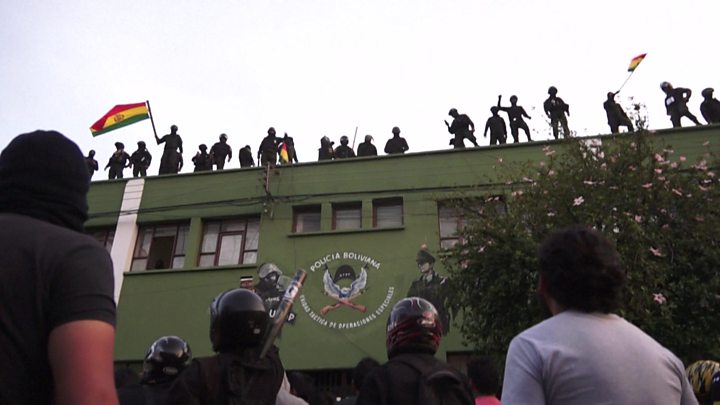Bolivia's governing party has called on its supporters to defend President Evo Morales, after police in some cities joined protests against him.
Demonstrators accuse Mr Morales, Latin America's longest-serving leader, of rigging last month's election to secure a fourth term.
On Saturday, opposition protesters overran two state-run media outlets in La Paz and forced them off air.
Mr Morales denies any wrongdoing and says he will not resign.
He also condemned the seizure of the TV and radio stations , tweeting: "They [the protesters] say they defend democracy, but they behave as if they were in a dictatorship."

Media playback is unsupported on your device
The country's defence minister said there were no plans to deploy the military to quell the police "mutiny".
For their part, Bolivia's armed forces said they would never go against the people and that the crisis needs to be solved by democratic means.
So far, three people have died and hundreds have been injured in the unrest, which has lasted more than four weeks.
The president's main rival, Carlos Mesa, has rejected an offer of dialogue - instead insisting on new elections and Mr Morales' resignation.
What do we know about the demonstrations?
Mr Morales' party Movement for Socialism called on its supporters to come to La Paz and "defend" the results of the controversial election.
The previous day's demonstrations, on Friday, were the first to include large numbers of police - though the scale was unclear.
Uniformed officers joined protesters in cities including La Paz and Sucre.
Speaking to local media, several uniformed officers called on Mr Morales to resign - and said they would stop him from turning Bolivia into a dictatorship like his allies in Cuba and Venezuela.
In a tweet, President Morales denounced the protests as an "attack on the rule of law".
Defence Minister Javier Zabaleta, speaking with state television, called for calm and said he was confident police would "continue to fulfil their constitutional job to safeguard the people".
Earlier this week, the mayor of a small town was attacked by protesters who dragged her through the streets barefoot, covered her in red paint and forcibly cut her hair.
Why are people protesting?
Bolivia has been rattled by protests, strikes and roadblocks since the country held a presidential election on 20 October.
Tensions first flared on the night of the presidential election after the results count was inexplicably paused for 24 hours. The final result gave Mr Morales slightly more than the 10-percentage-point lead he needed to win outright in the first round of the race.
The Organization of American States (OAS) is conducting an audit of the votes, and the results are expected to be published next week.
But Mr Mesa - the candidate who finished second - has spoken out against the audit, saying that his party was not consulted.
A former president himself, he has asked Bolivia's congress to pass an emergency bill to prepare for new elections.
https://www.bbc.com/news/world-latin-america-50363765
2019-11-10 03:41:18Z
52780430510517
Tidak ada komentar:
Posting Komentar